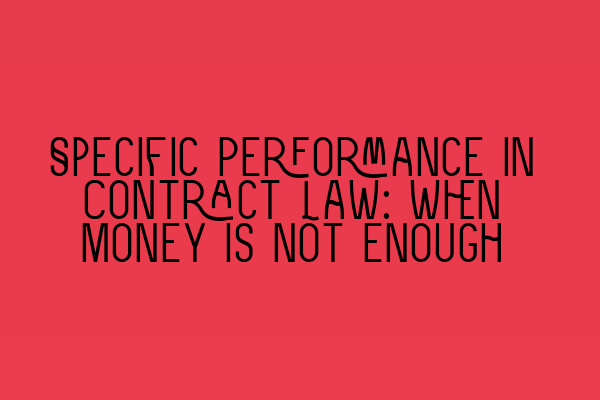Specific Performance in Contract Law: When Money Is Not Enough
In contract law, the primary remedy for a breach of contract is usually monetary compensation. This compensation, known as damages, is designed to put the injured party in the same position they would have been in had the contract been performed properly. However, there are certain situations where money alone is not enough to fully remedy the harm suffered. In such cases, the court may grant a remedy called specific performance.
Specific performance is an equitable remedy that requires a party to actually perform their obligations under the contract, rather than simply providing monetary compensation. It is only awarded in limited circumstances where the court believes that money is an inadequate remedy and that performance is necessary to achieve justice.
So, when exactly is specific performance available? Let’s explore a few scenarios where this remedy may be appropriate:
1. Unique or Rare Goods or Services:
Specific performance is often granted when the subject matter of the contract is unique or rare, making it difficult to find a suitable replacement on the market. For example, if you have entered into a contract to purchase a one-of-a-kind piece of artwork, monetary compensation may not be sufficient to compensate you for the loss of that specific artwork. In such cases, the court may order the breaching party to deliver the artwork as originally promised.
2. Real Estate Transactions:
In real estate transactions, specific performance is commonly sought when a buyer wants the seller to follow through with the sale. This is particularly true when the property in question has unique features that are hard to find elsewhere. Monetary compensation may not adequately address the buyer’s interest in acquiring that specific property. By ordering specific performance, the court can force the seller to complete the sale and transfer the property.
3. Personal Services Contracts:
Specific performance may be sought in contracts for personal services, such as employment agreements or contracts with unique performers. If a person with exceptional skill or talent breaches their obligation to perform, monetary compensation may not adequately compensate the injured party for the loss of that person’s specific skills. In such cases, the court may order the breaching party to perform their obligations under the contract.
It is worth noting that specific performance is not awarded as a matter of right. The court has discretion to grant or deny this remedy based on the unique circumstances of each case. Factors such as feasibility, fairness, and practicality will be considered before ordering specific performance.
While specific performance is a powerful remedy, it is not without its limitations. There are situations where it may be impractical or impossible to force a party to perform their contractual obligations. For example, if the subject matter of the contract has been destroyed or if the party is physically incapable of performing. In such cases, the court may award damages instead.
In conclusion, specific performance is a remedy that goes beyond mere monetary compensation in contract law. It is reserved for situations where money alone cannot adequately address the harm caused by a breach of contract. Whether it is a unique piece of artwork, a rare property, or a contract for personal services, specific performance ensures that justice is served by requiring the breaching party to actually perform their obligations. However, it is important to remember that specific performance is not always available and is subject to the court’s discretion.
If you found this article helpful and would like to learn more about contract law or prepare for the SQE exams, check out these related articles:
– SQE 1 Practice Exam Questions
– SQE 1 Practice Mocks FLK1 FLK2
– SQE 2 Preparation Courses
– SQE 1 Preparation Courses
– SRA SQE Exam Dates
Remember, understanding the intricacies of contract law and the available remedies is essential for any solicitor or law student.
